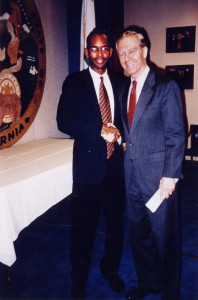By Mark Charles Hardie.
Khalid Hussein*, a well-known and mysterious conspiracy theorist in Long Beach, California befriended me when I was 11 years old. He was an intense man committed to racial separation. He believed that the primarily white neighborhoods of the city such as Belmont Shore and Naples Island should be separated from the primarily minority areas of the city such as East Long Beach and North Long Beach. At the time of my childhood, the public schools in the city were largely segregated along racial lines.
Khalid almost invariably wore black boots, all black leather clothing, and a Nazi swastika stitched to his left arm. He strongly identified with the ideas of white power. Many of the young people in our neighborhood admired and respected Hussein partially because of his fierce and charismatic oratory. He would often deliver racially-charged speeches in front of our high school.
One Sunday evening, Khalid and I strolled down the street and entered an elementary school in one of the more affluent neighborhoods of the city. As I stood next to the tennis court, Khalid Hussein initiated me as a full member of the white power movement. I committed myself to white power, and I literally became a self-hating black American. I was transformed into a black youth who supported white dominance.
There I stood a young, brown-skinned preteen born in Southern California, and I had become a supporter of white power. Yet somehow I sensed no confusion. Instead, I sensed power. As a child, I learned to associate whiteness with supremacy, dominance, and power. Ever since I viewed the music videos “Sweet Child of Mine”, “Welcome to the Jungle,” and “Paradise City” by the rock group Guns and Roses, I felt a strong attraction to white power. I desperately wanted to reflect a white identity.
At that moment I was led in a prayer in which I pledged my allegiance to Third Reich Bishop Ludwig Muller, and I promised to support then South African apartheid leader P. W. Botha. Both Muller and Botha were admitted bigots. I was told to denounce Nelson Mandela which I did. Yet I felt that I needed to accept white power in order to survive and thrive in white America. I believed that I-as an African American-would only be able to survive if I promoted white dominance. From my perspective, accepting white power seemed like my only choice. I was a convict in a prison of total oppression. Deep within my soul, I had a choice between promoting whiteness or accepting catastrophic failure as a man with an enslaved soul. I was chained to a false dichotomy.
I was a member of the white power movement for most of my preteen and teenage years. My white power beliefs began to slowly change after I befriended a Jewish girl named Sarah*. She invited me to a Sabbath service at a synagogue. During the service, I was impressed by the Jewish prayers and songs.
A few years later, while in my late teens, I traveled to New York City where I visited the Crown Heights neighborhood. After arrangements were made by a Jewish acquaintance I had a personal meeting with Rabbi Menachem Mendel Schneerson of the Chabad Lubavitch Hasidic Jewish group. I passionately told Rabbi Schneerson about my support of the white power movement. After listening to me, the influential rabbi replied, “Heb Rachmones” which was translated from Yiddish as “Have compassion.” The rabbi asked me to abandon my white power beliefs.
After meeting with Rabbi Menachem Mendel Schneerson, I decided to distance myself from the white power movement. I then informed my former mentor Khalid Hussein that I was no longer a member of the movement. Rather than promote hatred and white power, I decided to become a supporter of civil rights and social justice. In my high school, I joined various ethnic student clubs in order to learn more about ethnic diversity.
Today, more than 25 years after I left the white power movement, I am now a serious and committed advocate for empowering the poor and oppressed. As a member of the National Association for the Advancement of Colored People, the National Organization for Women, and the World Jewish Congress, I stand firmly in support of the declaration written by Thomas Jefferson that all human beings are created equal and endowed with unalienable rights. I now believe that all races and ethnic groups should work together to make our would more peaceful, more harmonious, and more just.
I now follow the examples of great leaders such as Dr. Martin Luther King Jr, Rev. Jesse Jackson, and Rosa Parks. I will dedicate the rest of my life towards speaking out against racism, bigotry and hatred. In order to support fundamental fairness and colorblind compassion, I have created an organization called “A Trillion Points of Light”. Together, we shall overcome injustice and create caring communities.
*Khalid Hussein’s name has been changed to protect his identity. *Sarah’s name has changed to protect her identity. The goal of this essay is not to promote and further instances of racism, hatred, or oppression. Rather, the objective of this essay is to help others overcome self-hatred and internalized oppression.
Mark Charles Hardie is an attorney, journalist, and published author. He is a military veteran who has published five books including “Black & Bulletproof: An African American Warrior in the Israeli Army”. He earned a Doctor of Law degree from the University of California, Hastings College of the Law. He earned a Bachelor of Arts degree from the University of California, Riverside. Mr. Hardie was an international student at the University of Costa Rica and the Hebrew University of Jerusalem Faculty of Law. He is the founder and chief executive officer of “A Trillion Points of LIght”, an organization that supports social justice and fundamental decency.



